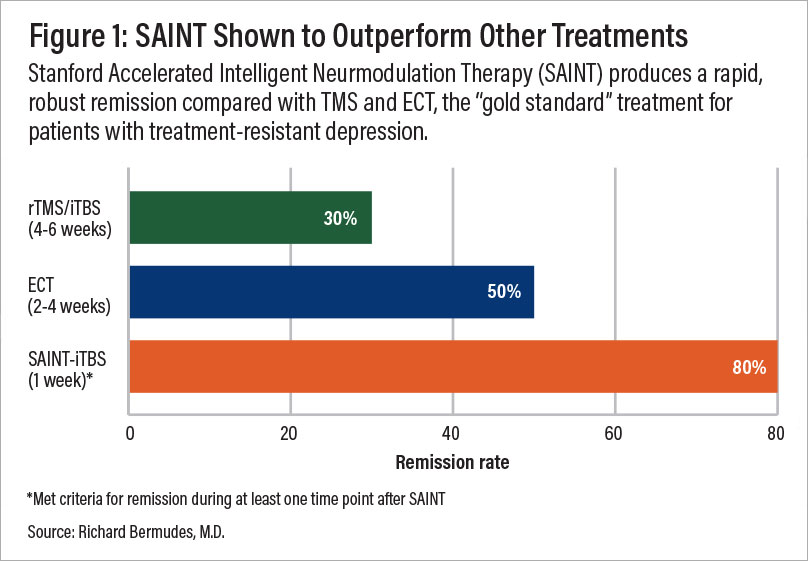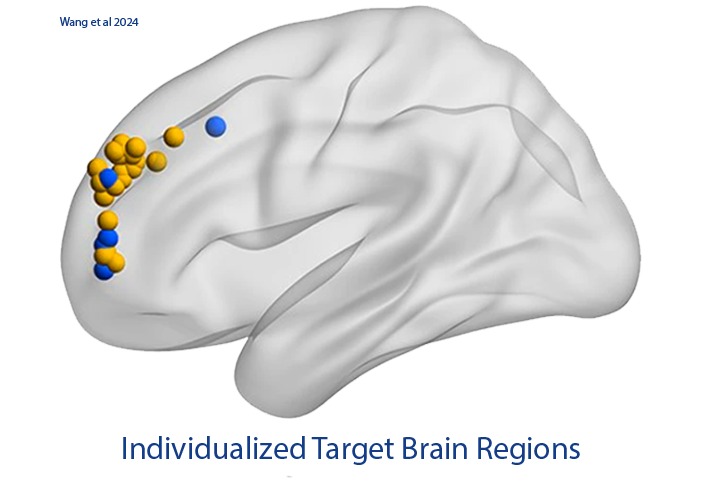TMS Articles
Learn more about different aspects of accelerated fMRI-guided TMS. See if treatment can help you live the life you want to live.
Are you tired of struggling with persistent depression? Our innovative, non-invasive treatment uses advanced FDA-approved iTBS technology to target the areas of the brain that can help you reclaim your mental well-being.



Grey represent fMRI guided TMS and black is sham treatment. (Cole et al 2022)
"Cognitive FX gave our daughter her life back! ... Cognitive FX is incredible; I can not adequately put into words how much we believe in their recovery program. We love the staff, and diagnostic measures, the recovery program, and the post-care follow up. I honestly can not think of one negative thing to say. The therapists are so attentive, skilled, caring and fun. Dr. Fong and RN Kaydee Severs are so incredibly smart, thorough in their explanations and exceptionally compassionate."
Review Source:
https://g.co/kgs/B5hSJ8
"Everyone was super nice and encouraging. The therapies were tailored to my individual strengths, weaknesses, and needs. I have had significant improvement and my last FMRI came back looking significantly better than the first one. I feel like I am getting back to my old self after nearly 5 years of problems and pain. I'm so grateful to everyone at Cognitive FX who helped me on my journey!"
Review Source:
https://g.co/kgs/5SLZpJ
"This place saved the life of someone we love. I was so impressed with the level of professionalism and care that we received. This facility is a blessing and I wouldn't hesitate at all to work with this team."
Review Source:
https://g.co/kgs/Hz35Pp
"Cognitive Fx is a great place to receive treatment for post-concussive syndrome. They definitely listen to all the symptoms you experience in an objective manner. Their exams provide great validation of the weird post-concussive symptoms that neurologist typically have a hard time diagnosing. Also, just after a few days of treatment, I began noticing improvements on my symptoms. I’m very thankful for Cognitive Fx and I look forward to their science and research being utilized more in the treatment of brain injuries and complications."
Review Source:
https://g.co/kgs/W15sui
"...EPIC treatment at Cognitive FX was a lifesaver. I was shocked at how much better I felt after my week there! The fog lifted and the fatigue finally began to let up. I could focus, read, and attend better. I felt like myself! When the fNCI scan scientifically backed up what I was feeling, I cried with joy! The entire team is great! Everyone was so caring and helpful! The value of brain function is well worth the cost. I would recommend anyone who is struggling with PCS to meet with Dr. Fong. It was worth every penny I paid and more! I continue to work the program for brain health given to me when I completed the treatment."
Review Source:
https://g.co/kgs/zBo59R
"Best decision of my life, great experience, absolutely the best staff in health care, learned more about my injury than I would’ve dreamed of and got to know people that have gone through the same hardship as me, very helpful! If you’ve been suffering with PCS, think no further!"
Review Source:
https://g.co/kgs/hYv6uo
"I found this clinic during an online search of my symptoms. These guys are the first people to have ever taken me seriously and are some of the kindest human beings I have ever met. The program is extremely intensive and while I have not recovered fully yet, I feel like I have hope for the first time in 5 years. They give you a customized program to follow when you go home and I hopeful that by following this I will continue to improve. If you are struggling with brain function issues, please give them a shot - they are expensive but truly the best of the best."
Review Source:
https://g.co/kgs/SwJYMW
"This therapy treatment program was a lot of work but after just my first 2 days I had already seen so many positive impacts in my health. My body started to begin functioning like it did before my concussion. Everyone was very helpful and patient with me. I also loved that all the treatments were catered to my physical needs everyday."
Review Source:
https://g.co/kgs/uLhW6G
I cannot rate Cognitive FX highly enough! Their accelerated TMS treatment proved to be incredibly effective with clear results. The staff were approachable and friendly, happy to assist in any way possible, making sure my every comfort and need were being met. They were careful to collect all the fMRIs and other information they needed before starting treatment. The treatment itself took five, eight-hour days and I had a reliable schedule created for me, treatments intermittent with exercise, therapy, massage sessions, and time just to relax and take a break. Food was provided for lunches as well as snacks any time I wanted. The accelerated TMS, while not a comfortable treatment, was made better by the staff taking feedback and adjusting the machine accordingly and entertaining me through each ten minute session. This treatment and facility went above and beyond my expectations. Cognitive FX turned out to be the miracle I needed and it's my hope that more places like Cognitive FX will make this treatment accessible to anyone who needs it.
Review Source:
https://g.co/kgs/2onAArP
| Accelerated fMRI - TMS | Magnus Saints TMS | |
|---|---|---|
| FDA Approved iTBS | ✔ | ✔ |
| FDA Approved Neuronavigators | ✔ | ✔ |
| FDA Approved Figure 8 Coils | ✔ | ✔ |
| Number of Treatment Days | 5 | 5 |
| Treatments per Day | 10 | 10 |
| Total Treatments | 50 | 50 |
| Number of TMS Pulses | Aprox 90,000 | 90,000 |
| Resting motor threshold pulse intensity | 90-120% | 90-120% |
| FDA Approved Personalized DLPFC Targeting | ✘ | ✔ |
| Personalized DLPFC Targeting Assists Doctor in target location. | ✔ | ✘ |
| Personalized E Field Coil orientation | ✔ | ✘ |
TMS has been around for over 20 years. rTMS the most common type of TMS is delivered once a day for six weeks. fMRI-guided Theta Burst TMS is administered in 10-minute sessions, 10 times a day for one week. This new approach has been shown to almost double the efficacy of treatment. 79% of patients reported their depression in remission after treatment.

For patients with depression or treatment-resistant depression, the target site is called the Dorsolateral Prefrontal Cortex (DLPFC). This site is found in rTMS therapy by finding the motor cortex and measuring down 5.5cm. This approach can lead to many different targets based on head size and shape which vary from patient to patient. The fMRI allows us to precisely target the DLPFC and ensure we place the coil in the right location every time.

Chen et al 2024
There are two main differences: 1) We target the correct site with fMRI, and 2) We have a neuro-navigation device that ensures that we are right on target for every treatment session. Most clinics don't have these devices and use rule-of-thumb measurements to get the coil placed in the area they think is correct. This can lead to coil placement in less-than-optimal locations.

Treatment will last one week, 10 hours a day. The stimulation protocol will last about 12 minutes each hour, and then the remaining time will be used for cardio or rest. You will have your own private room to relax in during the rest period of treatment. TMS is a very safe protocol. Less than one in 10,000 treatments has an adverse outcome; the most commonly reported side effects are headache, scalp tenderness, and muscle twitching during treatment.
If you are dealing with symptoms of depression, TMS treatment could be right for you. If SSRIs haven't worked or you don't like the way you feel on medication, TMS could be a good option. As of now, fMRI-guided TMS has been shown to be the most effective treatment option for those dealing with depression.
Pricing ranges from $7000 to $12000 depending on what other services you might need. Currently, insurance only covers the rTMS protocol, which takes six weeks and is about 45-50% effective. Given the recent FDA clearance of fMRI-guided Theta Burst treatment, most insurance companies have yet to add it to the formularies they cover. Medicare covers in-hospital treatment for $19,703.00. Treatment is eligible for HSA and FSA reimbursement.
Learn more about different aspects of accelerated fMRI-guided TMS. See if treatment can help you live the life you want to live.





DISCLAIMER: SAINT™ is a trademark of The Board of Trustees of the Leland Stanford Junior University (“Stanford”) and has exclusively licensed such mark to Magnus Medical. Cognitive FX is neither endorsed by Stanford nor utilizes Magnus Medical equipment nor claims to be offering the SAINT protocol as prescribed by Stanford University et. al. or Magnus Medical. We provide fMRI guided intermittent theta burst TMS with target locations determined by fMRI and our prescribing physician.